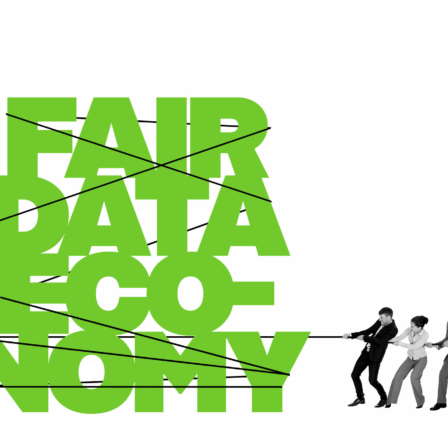How should the next Commission approach the digital revolution and the data economy? The last months have witnessed numerous calls for a renewal of industrial policy as a tool to counter the persisting dominance of the US and China in the data economy and future technologies in more general. While this impetus is important and warranted, the question remains: What is the right industrial policy for the European digital economy to thrive?
Past attempts to foster industrial cooperation in Europe in order to support the development of services able to compete in the worldwide digital economy have regularly failed to meet their political ambitions. Isolated initiatives to support industrial cooperation show the overall difficulties of finding an effective European answer to the pace of the digital revolution and the challenges of the data economy. They also miss the fact that a lot of innovation in recent years has not emerged out of corporate R&D labs, but from within innovation “ecosystems” of smaller companies with the right access to networks of talent, capital and local legal and market expertise.
An economic policy based on facilitating access to public and private funding, creating the right conditions for small business to grow and deploy internationally, while improving transfers between research and businesses, hence seems more appropriate to foster the European data economy than a grand industrial strategy. Building a “European data economy” should also entail the fostering of Europe’s inherent strengths and values.
Building a digital “Airbus” as Europe’s answer to the digital revolution – short history
Finding a common European answer to the digital revolution is not a new idea. On the contrary, its history is almost as long as the European Union and modern computer science. In the 1970s, Philips (NL), Siemens (GER) and the Compagnie internationale pour l’informatique (FR) launched the “Unidata” project, aimed at developing European products able to compete with American companies like IBM. The project lasted two years and was stopped following profound political disagreements.
Strong state support for the development of national telecommunication infrastructures −the so-called “Internet Superhighways”− took place during the 1990s. However, the idea of creating a digital “Airbus” didn’t vanish. The Franco-German public-private project “Quaero” for instance, supported by Schröder and Chirac in 2005, and was supposed to be Europe’s answer to existing American “Boeings” in the digital economy, in this case search engines. The program was eventually abandoned; again due to divergent national interests.
The first common policy agenda was set up with the Lisbon Strategy launched in spring 2000. It focused on the transition to a “knowledge society”, supporting research and education, but also the dissemination of information and communication technologies, namely e-commerce and mobile communications. Once more, results were poor: in the early 2010s, US firms already held 80% of stock market valuations of tech firms; European ones only 3%. When the Lisbon strategy was launched, half of the sales in the mobile industry were from European companies such as Alcatel, Ericsson, Nokia, Philips or Sagem. They almost completely disappeared in favor of smartphones today.
Understanding the real challenges of the data economy
Grand strategies to support isolated industries or technologies are doomed to fail in the EU, given historical experiences. The potential of European cooperation should not be underestimated however. It just has to be facilitated with a solid underlying analysis of the actual challenges that the data economy poses for European economies.
In this respect, it is worth thinking beyond the current start-up model (linked to the App economy that emerged with the wide spreading of smartphones) and to reconsider the role of larger corporations. The emerging wave of technological innovation (from machine learning to Internet of Things, robotics etc.) will be much more hardware-based as well as capital- and knowledge-intensive, and most of all dependent on access to vast amounts of often specialized data troves. This suggests that European cooperation can be very effective if it is based on:
- The definition of common standards
- Joint investment in costly infrastructures or research & development;
- Common research programs and knowledge-sharing
- The support of data-pooling between both public and private organizations.
What is the “European approach” to the digital economy?
These efforts should avoid “watering can” approaches, meaning untargeted or fragmented support. Instead, economic fields with great potential for European cooperation should be identified. They should match with European inherent strengths, shared visions and leverage on the importance of Europe’s internal market, representing 500 million “data subjects”, in order to develop new standards and increase the competitive advantage of European businesses. Three areas could fulfil this purpose:
- The convergence of ecological and digital transitions:
Europe is a leading actor in the field of sustainable development, both on a political and economic level. The building of technical solutions for a sustainable future will heavily rely on network technologies, creating important business opportunities and growth potential in various sectors (energy, agriculture, mobility). Smart grids or IoT solutions are already creating new models that allow important optimizations in the use of resources and foster new distribution models. This will also apply to the digital sector itself, where Green IT solutions will help to reduce the ecological impact of networks, data centres, or processors. - Data security and privacy:
The global impact of the General Data Protection Regulation (GDPR) but also previous European jurisprudence (like the “right to be forgotten”) shows that the EU is a key player in the definition of the principles and values that guide the international development of the digital revolution. This position could give European companies a competitive edge, as awareness around privacy and data security has risen. The success of start-ups like the French “Snips”, developing AI solutions and chatbots respectful of privacy, or the German “Nextcloud”, a personal information management system, show that there is a growing demand for technological and business solutions “made in Europe”, standing for a more respectful handling of user’s data and greater security guarantees. - Alternative models for the Internet:
The European Union has already taken important measures to limit monopolistic positions and lock-in strategies that prevent free competition both on consumer and business markets. This agenda has been pushed forward through legal procedures and should be followed by a proactive support of alternatives (e.g. open source technologies promoting interoperability between services) that can allow the emergence of a more open and decentralized technological framework, freeing and spreading innovation capacities of all players.
Questions
- What are similarities and differences between the American, Chinese and European approaches to the digital transformation?
- How should the next Commission approach Big Tech?
- What is the global role of the EU in the regulation of the digital transformation?
Sitra’s guest atricles give a voice to the players of the future in different fields. They do not (necessarily) directly link to Sitra’s work or agenda, but are the authors’ thoughts on current issues that relate to the themes Sitra is passioned about.









LATEST
Read more